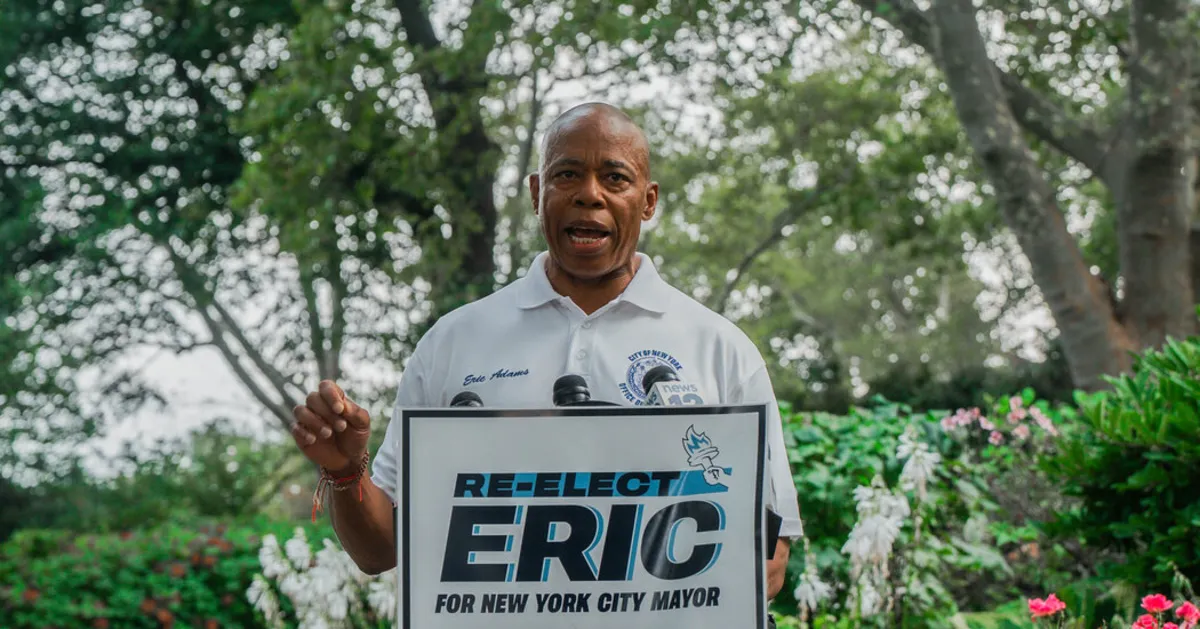
On Sunday, Mayor Eric Adams of New York City announced the surprising decision to abandon his struggling campaign for a second term, significantly altering the dynamics of the race to govern the nation’s largest city with just five weeks remaining until Election Day. Despite his public commitment to continue campaigning amid disappointing poll results, behind the scenes, Adams was actively exploring various exit strategies to avoid an embarrassing electoral defeat. Reports suggest that at one point, his advisors were even engaged in discussions regarding a potential ambassadorship to Saudi Arabia, which ultimately fell through.
In a nearly nine-minute video message posted on social media, Adams revealed his decision to step back from the race. He did not indicate any specific job lined up for his future. Instead, the mayor acknowledged that despite his relentless efforts, he could not envision a viable path to securing a second term. He attributed the challenges facing his campaign to “repeated rumors of my departure” alongside a decision by the city’s Campaign Finance Board to deny him public matching funds, which severely hampered his campaign’s momentum.
Rather than endorsing any of his competitors, Mayor Adams urged voters to scrutinize both Assemblyman Zohran Mamdani, the Democratic nominee and front-runner, as well as former Governor Andrew M. Cuomo, a third-party candidate. Without directly naming Mamdani, a self-identified democratic socialist, Adams warned of “insidious forces” promoting “radical, divisive agendas” in New York City politics. He expressed concern over politicians who advocate for dismantling established systems, urging New Yorkers to remain skeptical of movements that promise significant changes led by untested leaders.
While avoiding a direct mention of Cuomo, Adams criticized individuals he perceived as unreliable, stating, “They cannot be trusted. They do not value you or your future. They are out for themselves, not you.” The mayor intends to fulfill the remainder of his term, and notably, his name will remain on the ballot for the upcoming election since the deadline to withdraw has already passed.
This decision marks a significant turning point in Adams' political journey, which has been characterized by both triumphs and challenges. Rising from a working-class background in Queens, he overcame personal hardships, including police brutality in his youth, to ascend to the highest office in New York City government. Once considered a potential future candidate for national office, his career has faced setbacks, including recent allegations of corruption that have overshadowed his accomplishments.
The electoral implications of Adams’ exit remain to be fully realized. Polls consistently placed him in single digits, suggesting that his departure may not significantly impact the overall vote distribution. However, it could provide a much-needed boost to Cuomo, who, like Adams, is a moderate Democrat running on a third-party ticket. Cuomo has been actively attempting to close the gap with Mamdani, who currently holds a commanding lead. Both Cuomo and former President Donald Trump had previously urged Adams to withdraw from the race as part of a strategy to consolidate opposition against Mamdani.
Cuomo is optimistic about attracting votes from constituencies that previously supported Adams, particularly among Black and Orthodox Jewish voters, and aims to secure significant contributions from business leaders opposed to Mamdani. However, the timeline is tight, and catching up to Mamdani will be a challenging endeavor. Even if Cuomo manages to win over a considerable portion of Adams' supporters, recent surveys indicate that Mamdani would still maintain a substantial lead.
Cuomo's campaign could gain additional traction if he persuades Curtis Sliwa, the Republican nominee, to exit the race. Unlike Adams, Sliwa has firmly rejected calls to suspend his campaign, even facing pressure from Trump, who has publicly ridiculed Sliwa's candidacy as unserious.
Throughout his tenure, Mayor Adams, now 65 years old, has faced numerous challenges, including federal corruption allegations and an ongoing stream of scandals surrounding City Hall. He fought hard to maintain his position, believing there were opportunities for a resurgence following the June Democratic primary, where Cuomo finished second to Mamdani. Adams had opted to run as an independent, acknowledging his dwindling popularity within the Democratic Party.
As Adams reflects on his political journey, he has begun to craft a narrative that attributes the failure of his campaign to factors beyond his control. In a recent interview, he expressed that media reports regarding his deliberations had “undermined” his campaign efforts. His chief of staff, Frank Carone, voiced support for the mayor’s decision, citing various external factors that impacted their campaign’s viability. Carone suggested that this shift might not signify the end for Adams but rather a strategic pivot aimed at defeating Mamdani.
For Adams, who has spent decades rising through the ranks of public service, Sunday’s announcement represents a significant personal and political setback. He entered City Hall with ambitious objectives centered on crime reduction and the city's recovery from the COVID-19 pandemic, achieving notable successes in economic resurgence and crime rate reductions. The future of his political career remains uncertain as he navigates this unexpected turn of events.